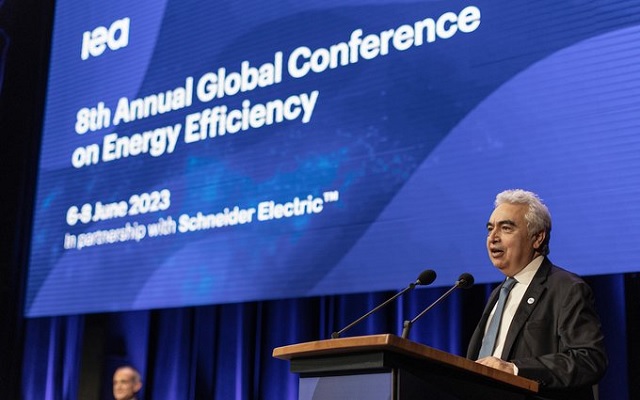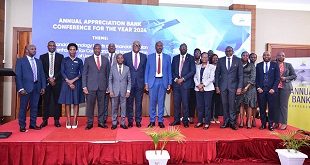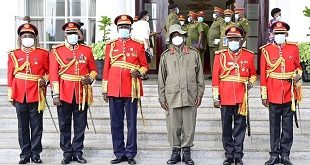
Kampala, Uganda | TE INDEPENDENT | Forty-five governments from around the world including Uganda have endorsed doubling the average global rate of energy efficiency improvements by the end of the decade.
They pledged to support stronger policy action and prioritize investment in a ‘crucial decade’ for energy and climate targets.
They say improving the deployment of energy-efficient technologies will foster sustainable economic growth.
In a ministerial statement released on Friday following the IEA’s 8th Global Conference on Energy Efficiency in Versailles, France, governments from across Africa, the Americas, Asia, and Europe highlighted the critical role that energy efficiency can play in improving living standards and energy security and in accelerating the clean energy transition toward reaching net zero emissions by 2050.
This means ramping up annual energy efficiency progress from 2.2% today to over 4% annually by 2030 in a move that would create jobs, expand energy access, reduce energy bills, decrease air pollution, and diminish countries’ reliance on fossil fuel imports among other social and economic benefits.
The Versailles Statement on “the crucial decade for energy efficiency” urges all parties and stakeholders taking part in the COP28 Climate Change Conference in Dubai later this year to raise their ambition and strengthen energy efficiency policy implementation in line with the Paris Agreement.
It underscores that effective policies must be fully leveraged to encourage behavior change among consumers and businesses, with targeted actions to support individuals, especially vulnerable and low-income households.
Uganda is among the countries that are yet to find a lasting solution to ensuring energy efficiency.
While close to 90% of the urban population depends on charcoal for cooking, the burning of charcoal itself has been found to be wasteful.
Some scientists at the national forestry Authority estimate that for every one thousand kilos of wood burnt to make charcoal, only one hundred kilos are derived from it with the rest burning to ashes. It has also been observed that the so-called energy-saving cook stoves vary in energy efficiency in the absence of a national standard.
The participating ministers also stressed the importance of addressing energy poverty, promoting clean cooking, and tackling gender issues relating to energy. A study by International Energy Agency (IEA) this month found that Up to 2.3 billion people still use polluting fuels and technologies for cooking, largely in sub-Saharan Africa and Asia.
The Global Conference was co-hosted by France’s Minister for Energy Transition Agnès Pannier-Runacher and IEA Executive Director Fatih Birol, and organized in partnership with Schneider Electric.
“It’s hard to overstate the importance of energy efficiency for strengthening energy security and keeping the goal of limiting global warming to 1.5 C within sight, so I’m delighted that countries from across the world are uniting around the IEA’s call to double energy efficiency progress by 2030,” said Dr Birol, the IEA Executive Director.
“This can help drive stronger momentum behind efforts to achieve an ambitious outcome at COP28 in Dubai.” Ministers made it clear in the statement that the public sector must be a role model for improving energy efficiency and driving investment that will encourage other sectors such as industry, services, buildings, transport, and agriculture to follow.
A special briefing report from the IEA published on the first day of the Global Conference Energy Efficiency: The Decade for Action shows the range of benefits energy efficiency improvements can bring to societies worldwide. The efficiency sector employs tens of millions of people around the world, and increasing ambition and action could create another 12 million jobs by 2030.
Importantly, more efficient and lower energy demand supports faster progress toward universal access to modern energy in emerging and developing economies. Promoting energy efficiency progress in emerging and developing economies will be at the heart of the next IEA Global Conference, which will be held in Nairobi, Kenya, in 2024.
The ongoing energy crisis and worsening climate crisis highlight the need for economies around the world to become more resilient and responsive to short-term shocks, whilst simultaneously ensuring alignment with longer-term economic, environmental, climate change and social objectives.
Those that endorsed this decision included Uganda, Kenya, Togo, Ukraine African Union, Angola, Argentina, Australia, Azerbaijan, Brazil, Canada, Costa Rica, Czech Republic, Denmark, Ethiopia, Germany, European Commission among others.
*****
URN
 The Independent Uganda: You get the Truth we Pay the Price
The Independent Uganda: You get the Truth we Pay the Price


